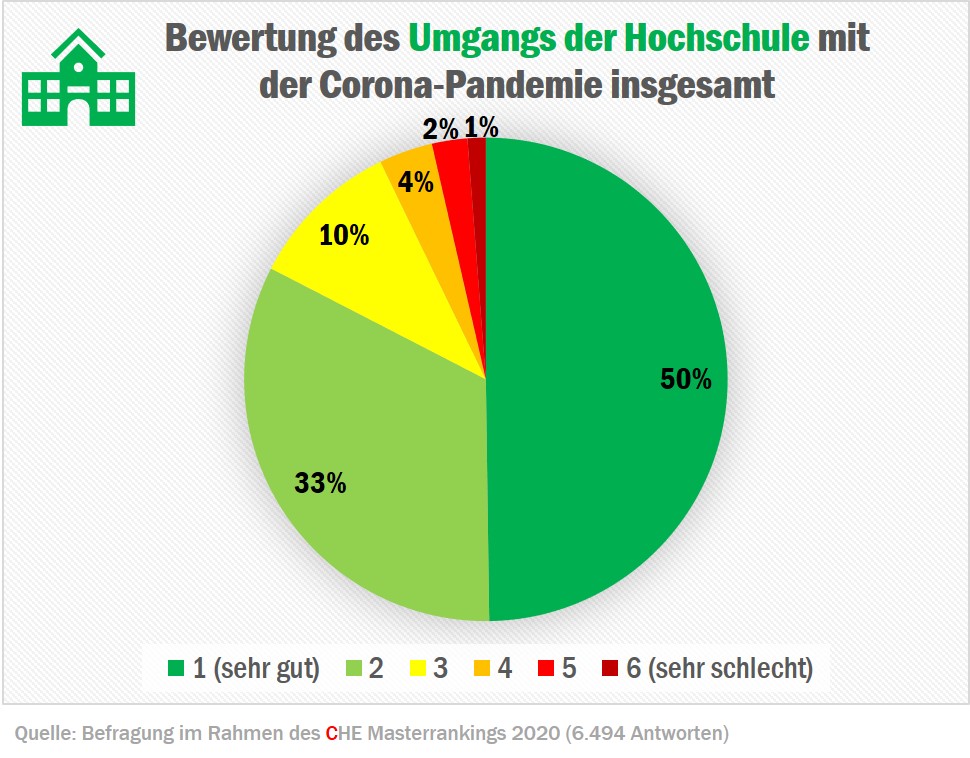 Studium während der Corona-Pandemie - Foto: Engin Akyurt/Pixabay
Studium während der Corona-Pandemie - Foto: Engin Akyurt/PixabayThe need to switch completely to online teaching owing to the coronavirus pandemic was a major challenge for higher education institutions (HEIs) in Germany. From the perspective of business students, however, they did a good job. Approximately 80 per cent of the 7,000 or so Master’s students surveyed recently by CHE rated their university’s crisis management as “good” or “very good”. Positive feedback was also given on aspects such as information management and online course offerings.
In March, the impact of the COVID-19 pandemic compelled HEIs in Germany to switch from face-to-face classes to online teaching within a very short period. In business courses such as Business Administration and Economics, which account for around one fifth of all students, students were largely very satisfied with their university’s crisis management.
In a survey of around 7,000 Master’s students on business degrees, nearly 50 per cent gave their university top marks for its handling of the coronavirus pandemic. In total, four out of five respondents rated their university’s crisis management as “good” or “very good”. The CHE analysis indicated similarly positive ratings for their information management. Again, around 80 per cent of the respondents described themselves as having been well informed or very well informed by their HEIs or departments.

“Generally speaking, the students appreciate that they were able to continue their studies throughout the summer semester, in spite of all the restrictions caused by the coronavirus pandemic; they felt well informed and supported by their university in this exceptional situation. They were able to finish the semester more or less as planned,” summarised lead investigator of the study Marc Hüsch from the CHE Centre for Higher Education.
On the whole, the Master’s students were satisfied with the range of digital teaching formats, such as online lectures and webinars. This was also the case with regard to the technical conditions, particularly in technology-based degree programmes such as Business Informatics.
However, students saw potential for improvement in the educational preparation of the online teaching formats. This aspect received the lowest proportion of top marks in the entire CHE survey (38 per cent).
“The technical requirements are in place and the teaching staff are highly motivated. However, not everybody knows how to implement online teaching didactically and how to support students in the learning process,” remarked Marc Hüsch, lead investigator of the study. “The students often noted in the survey that the quality of online classes differed greatly, depending on the teaching staff involved.”
For this reason, CHE calls for nationwide digital support services for university teaching. These should encompass training and exchange formats, as well as instructional designers who provide technical and didactical support to university teaching staff regarding the use of digital teaching and learning options. The latter are as yet rare in Germany.
Such support could consolidate the drive to digitalisation that has now been triggered at HEIs, and the experience gained in the process. “The hard work involved in creating digital formats also played a role in enabling Germany’s higher education institutions to cope well with the exceptional situation brought about by the COVID-19 pandemic,” summarised Frank Ziegele. “It would be disastrous if the insights on online university teaching gained this year were to be lost in later normal operations, when face-to-face and digital teaching are combined,” noted the CHE Executive Director.
About the study:
The data basis of the CHE analysis was the survey of 6,774 students regarding how their university and department handled the impact of the COVID-19 pandemic. The students were recruited from 236 departments at 124 German HEIs. The survey was conducted online as part of the student survey for the ranking of Master’s programmes by CHE, undertaken between 20 April and 31 August 2020. The respondents were Master’s students from years one to three taking Business Administration, Economics, Business Sciences, Industrial Engineering or Business Informatics. The students were asked to rank aspects regarding the organisation of studies during the coronavirus pandemic and the framework conditions for online teaching on a scale of 1 (very good) to 6 (very poor). Marc Hüsch wrote the publication entitled “CHECK – Wirtschaftsstudiengänge: Studienbedingungen an deutschen Hochschulen während der Corona-Pandemie” (CHECK – business courses: study conditions at German higher education institutions during the coronavirus pandemic). Detailed results are available in German here.
